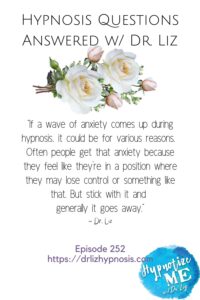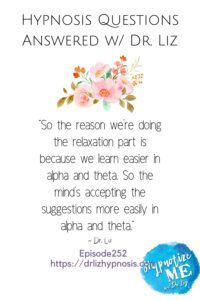Dr. Liz answers some of the interesting questions she gets about hypnosis like:
- What if I get interrupted in the middle and How to do a quick grounding
- What does it mean if I’m thinking about the grocery list during the hypnosis
- I get anxious when I start listening to a Hypnosis file
- Can everyone be hypnotized?
- Why do we do relaxation when we do hypnosis
See other questions like “Will I bark like a dog” at https://www.drlizhypnosis.com/episode1
Get Free hypnosis files at http://bit.ly/drlizhypnosis
 |  |
About Dr. Liz
Winner of numerous awards including Top 100 Moms in Business, Dr. Liz provides psychotherapy, hypnotherapy, and hypnosis to people wanting a fast, easy way to transform all around the world. She has a PhD in Clinical Psychology, is a Licensed Mental Health Counselor (LMHC) and has special certification in Hypnosis and Hypnotherapy. Specialty areas include Anxiety, Insomnia, and Deeper Emotional Healing.
————–
Do you have Chronic Insomnia? Find out more about Dr. Liz’s Better Sleep Program at https://bit.ly/sleepbetterfeelbetter
Search episodes at the Podcast Page http://bit.ly/HM-podcast
Help yourself with Hypnosis Downloads by Dr. Liz! http://bit.ly/HypnosisMP3Downloads
———
A problem shared is a problem halved. In person and Online hypnosis and CBT for healing and transformation. Schedule your free consultation at https://www.drlizhypnosis.com.
Listened to in over 140 countries, Hypnotize Me is the podcast about hypnosis, transformation, and healing. Certified hypnotherapist and Licensed Mental Health Counselor, Dr. Liz Bonet, discusses hypnosis and interviews professionals doing transformational work
Thank you for tuning in! Please subscribe to auto-download new episodes to your listening device.
Transcript
Hi everyone. Dr. Liz here. This is a quick episode about some of the questions I get about hypnosis. Some of them are really funny, some of them are really good questions. I did an early one, really my first episode on the podcast, first season episode one about hypnosis, FAQs, and answered, Are you going to bark like a dog?
No, I don’t have control over you to make you bark like a dog. Um, will I be able to drive afterwards? Yes. If I ground you well, if you ground yourself well, um, Can I talk during hypnosis? Yes. Will I fall asleep? Depends how tired you are. . Those are some quick ones that I answered in episode one, but here I have some new ones that I get over the years.
So one of the most common ones I get is What if I’m interrupted in the middle by something?
Um, and this is a really good question. So you’re relaxed, you’re listening to the hypnosis file. Maybe you feel a little floaty. Maybe you’re listening to every word. Either way is okay, and something interrupts you like a child comes up or the phone rings because you forgot to turn it off, or something like that.
What I recommend if that happens is that you do a quick grounding of yourself with a child. It may be that you can just answer their question and say, And then go right back into listening to the file. Let’s say it’s something that needs more attention and you can’t get back to the hypnosis file anytime soon.
Then do a quick grounding. Just notice five things around you, or the smallest object that, whatever color you want to pick, blue or red or green, or something like that. And just take some deep breaths, put your feet on the ground, and then. Continue on about your day. That can take less than a minute. That can take like five seconds, 10 seconds.
It can happen very, very quickly, is my point. And it’s okay to do that. Um, the type of hypnosis I do, the free ones that I offer you are not generally going so deep or doing highly emotional work that you couldn’t ground yourself if you got interrupted.
In my purview, highly emotional work is more for individual work that I’m doing with somebody.
I wouldn’t really recommend doing that type of stuff on your own. So that you do feel safe and that you’re not interrupted, and that you are saying aside the time to make sure that you’re delving into something, healing it, and then grounding.
All right, next, What about when my mind wanders onto the grocery list?
This is a good one.
This is totally fine. It really is . Okay? It’s totally fine. Your mind may wander onto all kinds of stuff, particularly in the beginning when we’re doing the induction slash relaxation part. Your mind’s going to wonder some, it may think about all kinds of stuff. But as your body begins to relax, usually the mind follows it.
So it begins to relax too and go more into a trance type of state. But if you continue to think about the grocery list, you have two options. You can continue to listen to the hypnosis file or you can end it and say, Okay, this is just not the right time for me. I’m going to try this again some other time.
Either way is okay. Now, next one is . . . What if I start listening and I start to get anxious.
This happens with people who have anxiety from time to time, that when we first begin, they’ll actually get more anxious. Like if that happens to you, I encourage you to stick with it because. Almost always, the anxiety will then decrease.
So it’s a wave it’s coming up. And it could be for various reasons. Often people get that anxiety because they feel like they’re in a position where they may lose control or something like that. But stick with it and generally it goes away. There was an older man that I was working with, uh, one time for sleep and trying to do a hypnosis for better sleep, and he got really anxious and to the point that he opened his eyes and began pacing around the room.
I worked with him in that state, meaning I said, Okay, I begin to ground him. And shift him out of that anxious state.
He was a really successful business owner, so I asked him to tell me a real success that he had had in his business and he began to talk about early on in his business when he was starting it, and his anxiety just went out the door when he did that because he was moving into a resource state.
That’s what we call that, like a resource state is something that you’ve done really well and that you know. That you have these resources inside of you. You have these skills inside of you, and when you move into a resource state, you feel good. There’s typically not a whole lot of anxiety associated with a resource state.
So once he shifted into that, the anxiety just flew out the door, and I just had him notice that and say, Yeah, okay. Perhaps hypnosis isn’t for you. Perhaps we try again another time, but notice what helps you move out of the anxious state. That’s more important than being able to “do hypnosis.”
So that leads me to the next question. Does it work for everyone?
No. It doesn’t work for everyone, and I can’t always predict that. There’s a whole area in the research around hypnosis about what they call hypnotizability, meaning can someone be hypnotized into what degree the new little kitty is like walking in the blinds over here. So you may hear her.
The way I think of it is it is a skill that you can get better at it. I also do some screening when someone’s in my office, and I use the visualization capacity scale developed by Pallson. Pallson is one of the leading researchers for decades around hypnosis for IBS. He’s at University of North Carolina, Chapel Hill Medical School.
That’s where they do a lot of that research as well as other places around the world. But he developed this visualization capacity scale that just says, How good are you typically at seeing visual images in your mind with your eyes closed? And then you have a, a one to six that people rate six, meaning I can see stable, detailed, and clear images in my mind that almost look as real as the ones I see with my eyes.
And one is I cannot see any images in my mind. And then he has, you know, 2, 3, 4, 5 explained. So someone circles this. I took a seminar with him and the way he said he uses this is that it tells him how hard he’s going to have to work. So he said he, he himself scores like a one or two or something. He’s not highly visually oriented.
That person that’s scoring lower on the scale is going to take a little bit more work to get into a hypnotic trance. Versus someone who’s scoring a six, that would be me, can go in pretty easily, very easily, and usually very quickly. Very quickly means, I don’t know, five minutes, five to 10 minutes, maybe even less than five minutes.
If they meditate a lot or they’ve done a lot of hypnosis or something versus someone who scores very low on it. A one. What he said is that it’s more like 15, 20 minutes to get them there. And then at that point you begin to make suggestions. This is another thing that people tend to misunderstand. We could put it under the FAQ.
It’s like, Why do we do relaxation slash induction when we do hypnosis?
And this one, I love explaining, but before I answered that, what Pallson had said is like, okay. Getting someone into the hypnotic state, a trance state is the bulk of the work. And then once they’re there, you can make the suggestions, but they really come at the end and you don’t even need very many to make some change once they’re in that state.
And you can see this reflected in his work I have in do his Protocol for IBS. And it is a lot, a lot of imagery. It’s very long. And then the suggestions for better bowel movements, more regular, less pain, all of that are really only a paragraph or two at the. It’s not the bulk of the hypnosis, no pun intended there,
So back to that question, Why do we do relaxation when we’re doing hypnosis? It’s because we’re moving the brain waves into a more relaxed state. So generally we walk around. If you’re talking having fun, you’re out, whatever, you’re in a beta brainwave state. That’s what we mainly walk around and it’s very active.
And if you see it on an EEG it’s you know, lots of like spiky lines and stuff all close together. Now, let’s say that you’re coming home from going out or being with people or being at work even, and the night’s going on and you’re winding down, and then you get into bed. You can see how I avoided saying lay or lie, right?
Because I cannot remember that , you lie down in bed or you lay down in bed. I think it’s, you lie down in bed anyway. You get into bed and your mind begins to relax. Some, however you do that, some people read, some people scroll on their phone. However you’re doing that, some people hit the bed and like, boom, they’re out.
But what’s happening is that your mind is moving into a more relaxed state, meaning your brainwaves are shifting into an alpha wave state, so the waves get more organized and a little bit longer. Theta is the next brainwave state, which is even deeper relaxation. And delta is very deep sleep, but your mind goes through the sequence.
So the reason we’re doing the relaxation part is because we learn easier in alpha and theta. So the mind’s accepting the suggestions more easily in alpha and theta. And this is changing physiology in the body. They know this from a lot, a lot of medical research that hypnosis actually changes physiology in the body.
We are changing neural pathways, so we want to make that very easy for you by shifting the brain waves into a more relaxed state. So I hope that makes sense for you. Those are just some quick questions that I’m answering here.
Again, I can’t make you bark like a dog or quack like a duck, but I can’t help you feel better, have less anxiety, certainly less insomnia, chronic pain, um, lose weight, stop over eating, that type of thing, be healthier, feel better, resolve some deeper trauma.
Combination of hypnosis and cognitive behavioral therapy, C B T, that’s what I do. Combination there. And sometimes we use D B T as well, dialectical behavior therapy, particularly if someone wants to work on better emotional regulation. Now, let me answer a question about that really quick. Some people have no idea what that term means.
It means that if you find yourself hotheaded, um, lots of highs and lows going on where you feel like you’re not very steady. Perhaps you snap at your family when you don’t really want to. Perhaps you find yourself, uh, more depressed than you would like after something happens or anxious, something like that.
Then we work on just helping you be a little bit more steady and to be honest, kind, kind to those you love and hopefully other people as well. I have a free hypnosis specifically for emotional stability. If you want to just start on your own and you can just subscribe to my newsletter and get that one.
It comes with two. Emotional stability and decreased fear and anxiety, and it truly will help you. Like I worked with someone earlier this year, 2022, who had listened to the emotional stability one, the free one, and it had helped her so much in her life that then she scheduled, um, some sessions with me to go even deeper.
And that was like wonderful work as. So don’t listen to them thinking, eh, they’re not gonna do much. They can be really impactful, even a free one. All right everyone. I’m going to end here. I hope you are healthy and safe and that you live with ease. Peace.
I hope you truly enjoy today’s episode. Remember that you can get free hypnosis downloads over at my website, dr liz hypnosis.com, D R L I Z hypnosis.com. I work all over the world doing hypnosis. So if you’re interested in working with me, please schedule a free consultation over at my website and we’ll see what your goals are and if I can be of service to you in helping you reach them.
Finally, if you’d like today’s episode, please subscribe to the podcast or tell a friend. That way, more and more people learn about the power of hypnosis. I Right. Everyone. Have a wonderful week. Peace. This podcast is not mental health treatment, nor should it replace mental health treatment. If you need therapy or hypnotherapy, please seek treatment from a trained professional.







